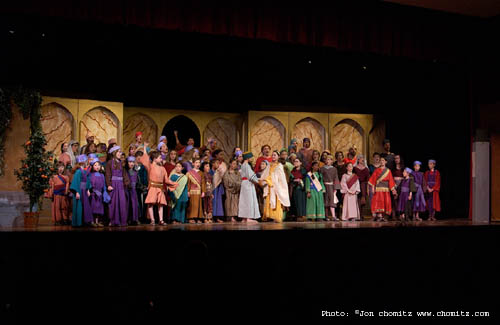March 20th, 21st, 27th and 28th, 2004
Music and Libretto by David Bass
Choreography by Deborah Mason

|
March 20th, 21st, 27th and 28th, 2004
Music and Libretto by David Bass
|

|
The world premier production of this original opera was performed at the King Open School, 850 Cambridge St, (East) Cambridge, Massachusetts Saturdays, March 20th and 27th at 3PM and 7PM, and Sundays, March 21st and 28th at 1PM and 5PM.

© Jon Chomitz
www.chomitz.com
In this sequel to Cambridge composer David Bass' romantic opera The Coronation of Esther, Queen Esther risks her life to save her cousin Mordechai and the Jewish people from Haman, the vengeful Grand Vizier of Persia.
Springtime for Haman is a sensitive and entertaining portrayal of the biblical story in two 50-minute acts and features lyrical music in a variety of popular and classical styles.
Casts differ from show to show. Consult the
cast schedule
to find out what shows your friends are in.
If they have a solo role, check the last column,
which shows which shows they have the solo in.
The beautiful Jewess Esther has been chosen to be Queen by the Persian
King Ahashveros, but she has not revealed her Jewish heritage, on
instruction from her ambitious cousin Mordechai. The King has also
named Haman, a wealthy Agagite, to be Grand Vizier, replacing the
indecisive Memucan. The conceited Haman commands that all citizens
bow down to him, but Mordechai refuses, citing Jewish law. Haman is
enraged by this insult and vows the annihilation of all Jews, who are
traditional enemies of the Agagites. Haman dupes the King into
approving an order that all Jews in the Persian empire be killed on a
specific date the following spring.
Mordechai grieves publicly upon seeing Haman's order, and he is
chastised for doing so by Hathach, one of Queen Esther's servants.
When Esther hears of Mordechai's despair, she meets with him
clandestinely. Mordechai convinces Esther to intercede on behalf of
the Jews.
Despite the danger to herself, Esther enters the King's chambers
uninvited (an act punishable by death) to ask that the King and Haman
attend a banquet at her residence. The King stays the automatic death
sentence and accepts Esther's invitation. Haman is flattered to be
invited to an exclusive feast with the King and Queen, but when he
leaves the palace, his elation turns once more to rage when Mordechai
again refuses to bow. Haman decides that he cannot wait until spring
to be rid of Mordechai, and at the suggestion of his friends, he
resolves to ask the King for permission to hang Mordechai from a 75
foot gallows immediately. Haman returns to the palace to wait for
morning, when he can next see the King.
Meanwhile, the King cannot sleep and asks a servant to read to him
from the chronicles of his own reign. The servant randomly selects a
passage from many years back, which happens to describe an incident in
which Mordechai saved the King's life by foiling an assassination
attempt. When the King learns that Mordechai was never rewarded for
his service, he calls Haman in to ask how best to honor a man whom the
King favors. Haman, thinking the King must be planning to honor him,
advises the King to have the honoree be led through the capital city
wearing the King's robes, riding the King's horse, led by the King's
noblest prince. The King then orders Haman to lead Mordechai through
the city exactly as he described.
After honoring Mordechai, Haman makes his way home through the city,
feeling disgraced and beset by demons. Once home, Haman seeks comfort
from his wife Zeresh. Zeresh tells Haman his pursuit of vengeance
against Mordechai and the Jews will only lead to his downfall and begs
him to stop, but Haman instead chooses to go with the King's servants
to Esther's feast.
At the banquet, Esther reveals her Jewish heritage to the King for the
first time and accuses Haman of plotting to kill her and her people.
The King is enraged and storms out of the room while Haman pleads with
Esther for mercy. When he returns, the King misinterprets Haman's
pleas as a physical assault on Esther and sentences Haman to death.
The King gives Haman's property to Esther and names Mordechai to
replace Haman as Grand Vizier. Mordechai issues an edict which
counteracts Haman's order, and the Jews of Persia are saved.
Synopsis: